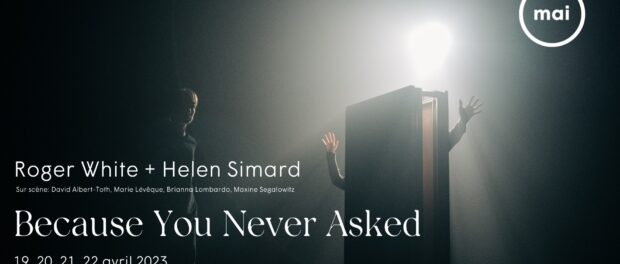Review: Because You Never Asked
Four dancers stand in a row in the dimly lit gallery space of the MAI with their hands resting on one another as if packed on a train. They glance about, nervous and uncomfortable as they jostle with the train’s movement. Where are they going? Is it the morning rush of a subway headed to work? Are they being sent to the death camps of Nazi Germany? Are they refugees headed to an uncertain new life? It’s a tense moment that leaves me anxious about what is to come.
So begins Because You Never Asked, a production that examines the nature of memory and specifically how memory is constructed and reconstructed throughout life and then continues to be taken up by subsequent generations. Composer and artistic director, Roger White, based the show on his half-Jewish grandmother, Marianna Clark’s experiences before her family fled to England during Hitler’s rise. Throughout the show, we hear excerpts from her diary, letters she wrote to a distant friend (possibly a boyfriend), and even interviews with White. Optimistic, the family thought Hitler would eventually be ousted and they stayed in Germany long enough to see their window of escape nearly slam shut. Details of life of an upper class family losing its rights in Germany through this period convey moments of horror, friendship, and beauty. In the cafe space are Clark’s photos and memorabilia that tie into moments of the play and suggest some of the other stories lived in a surprising life.
Accompanying the spoken portions drawn from Clark’s words is a soundscape of contemporary music also composed by White and a soul-demanding engrossing performance given by four dancers (David Albert-Toth, Brianna Lombardo, Maxine Segalowitz, and Marie Lévêque) under the direction of Helen Simard. The four stay in motion for much of the show in complicated movement patterns that repeat and sometimes speed up. Given the themes of the show, the choreography reminds me of the way memory is constructed as the hippocampus replays an event over and over again. but also how that memory fades and decays with time.
Initially, I found the show a bit abstract and confusing, especially as the movements of the two dancers in jumpsuits didn’t match the narrative about attending Jewish Summer Camp for Communists. But just as recalling a long forgotten memory, as the show continued, their movements began to take more identifiable forms. And it wasn’t long before the dancers in conjunction with Clark’s words became the most evocative part of the play. One particularly moving segment had the four dancers transforming raincoats into human-like puppets while Clark spoke about seeing Hitler’s give speeches. One by one, the raincoats “died,” as if to capture the situation of survival as others fled, were taken away to death campus, or were killed. For me, the most moving part of the play consisted an interview about seeing long-jumper Jesse Owens in the Olympics with a masterful choreography that combined racing starts out of imagined blocks and leaps with a flight for one’s life.
The story behind the show is also remarkable. White did not know of his grandmother’s experiences until he began interviewing her in 2012. Only then did he find out about his family’s obscured history. The fragility of the transmission of memory from one person to the next is very much a part of this show. During the interviews, we hear Clark explain to White that he’s never heard these stories “because you never asked.” But this further highlights that the effects of genocide, like the holocaust, are losses. Individuals and their histories are erased with no one to record them and the loss becomes ours.
All in all, Because You Never Asked is a moving piece, important in its message and beautiful in its interpretation.
Because You Never Asked is at the Montréal Arts Interculturels until April 22. Information HERE.
1 Comment on Review: Because You Never Asked
Comments are closed.







Helen and Roger it’s so exciting to follow you and your brilliant artistry. This one is a story I particularly hold in my heart, and the description of the piece is beautiful and heartfelt. I’m sorry I can’t see it. But I have a pretty good imagination. Kudos!